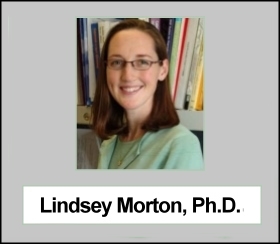
Lindsay M. Morton, Ph.D.
___________
Senior Investigator, National Cancer Institute
"When I began my training as a cancer epidemiologist in graduate school, I was drawn to study lymphoma because it affects so many people and because so little is known about the causes of the disease. I hope that my research efforts to understand the causes of lymphoma will help lymphoma patients and ultimately lead to disease prevention. I am honored and delighted to be chosen for this year's distinguished Young Scientist Award by the Lymphoma Foundation of America.
"From the beginning of my career studying the causes of non-hodgkin lymphoma (NHL), I have felt that a clearer understanding of the biological nature of each lymphoma subtype could lead to real progress in finding, reducing, or eliminating the causes of this disease. Therefore, I have dedicated my research efforts to identifying the risk factors for NHL by closely considering the distinctly different types of NHL.
"I began my research on lymphoma during my graduate studies at the Yale School of Epidemiology and Public Health by conducting a series of analyses of the Connecticut women's case-control study of NHL, under the guidance of the Principal Investigator, Dr. Tongzhang Zheng. I looked at how cigarette smoking, alcohol consumption, hepatitis C infection, and other factors affect the risk of developing lymphoma. Our work provided evidence supporting the role of hepatitis C infection and cigarette smoking in the increased risk of NHL, and showed that alcohol was associated with a decreased risk. I also co-authored additional studies that looked at how patients' medical conditions might predispose them to developing lymphoma.
"I was fortunate to have an opportunity to conduct analyses within the InterLymph Consortium, an open scientific forum for international epidemiologic research in NHL. By combining many studies conducted around the world, we hope to provide sufficient statistical power to detect associations by lymphoma subtype. Under the guidance of Dr. Zheng and Dr. Patricia Hartge, I led the first questionnaire-based studies to be undertaken by the Consortium. We designed a system to uniformly code questionnaire data and classify tumor types among nine disparate studies, thereby providing the largest combined dataset ever developed for NHL, with approximately 6,500 cases and 9,000 controls. Thus, we were able to report the most definitive data to date on the increased risk of follicular lymphoma associated with smoking and decreased risk of B-cell NHLs with alcohol use. The data showed that risks do, in fact, vary among lymphoma subtypes, and warrant further investigation regarding the mechanisms responsible.
"I arrived at the National Cancer Institute (NCI) as a postdoctoral fellow with the intention of expanding my research on the etiologic heterogeneity among lymphoma subtypes. My goals also included further development of my understanding of molecular epidemiology, under the guidance of Dr. Sophia Wang. Together with Dr. Wang and other lymphoma experts at NCI, I conducted a comprehensive analysis of NHL incidence rates in the U.S. using the updated World Health Organization classification system, which incorporates morphology, immunophenotype, cytogenic and molecular features, clinical behavior, and known etiology and pathogenesis into the definition of each disease subtype.
"At NCI, I am involved in research to identify and analyze suspected risk factors and patterns of risk among lymphoma patients in large cohort, case-control, and pooled studies. As there are opportunities to conduct high-quality molecular studies in collaboration with lab-based experts, I am leading several molecular studies investigating whether newly-discovered molecular markers are related to patient survival or to behavioral and environmental risk factors. I am also collaborating on several studies examining whether individuals may have a genetic susceptibility to NHL that can be triggered or amplified by environmental exposures, for example, to substances found in hair dyes and well-cooked meat."
|


